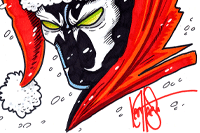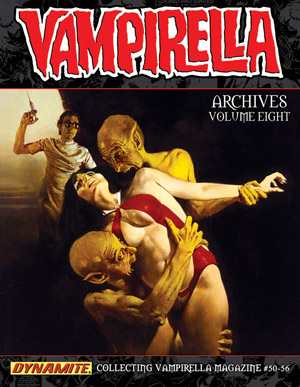|

|
THE
COTTON CLUB
By Mike
Cotton
Writer Brian
Michael Bendis talks about writing five monthly books,
his Hollywood projects and living in the comic book industry's
hottest talent pool-Portland, Oregon.
MIKE
COTTON: With five books a month now, how much time do
you spend writing each day?
BRIAN MICHAEL BENDIS: It's a hard question because,
you're writing all day. Just because I'm not typing doesn't
mean I'm not writing. Even when you're at the record store,
new things occur to me, you know what I mean? It's all writing.
And my favorite line is from David Mamet, he said Stephen
King says he gets up at nine o'clock and writes till five
at night, and David Mamet says Stephen King is a f***ing liar.
You can type for an hour and write the best ten pages, but
it took you a long time to get there. You know what I mean?
The actual typing isn't the thinking. So I'm kind of writing
all the time. But I do sit down to write every night.
COTTON:
So what's a normal day like for you?
BENDIS: Normal day? Honestly, I get up at about 1:30
in the afternoon. I'll ride my bike, play with my baby, play
with my wife, eat, and then sit down to work at about eight
or nine, until I pass out, and it's usually about seven or
eight in the morning. In that twelve hours is a lot of screwing
around, it's not like it's straight. But there is definitely,
definitely the sense of I have to get something done every
day, and that doesn't have to do with anything but that's
just how I am. I need to feel like something is accomplished
or I'll kill myself. Every day has to be productive.
COTTON:
But the hard work comes at a price. There are those who love
to rib you. Have you seen the "F**k Bendis" stickers at conventions
now? BENDIS: Yeah, about the "F**k Bendis" stickers.
All my friends like David Mack, were calling me from the show
going, "Someone's got f**k Bendis stickers." I was like, "Oh,
no, I'm Rob Liefeld, what happened? How did that happen?"
I was hoping it was a joke, you know? That kind of shenanigans.
I do get a lot of letters like that. "Dear Bald Dirty Jew,
you suck, you killed Christ, and PS I love Ultimate
Spider-Man." I get that letter like every hour. It's funny.
It's only funny because it happens every hour and everyone
thinks they're the first person who wrote "Dirty Jew." It
was a hard weekend before I found out exactly what the score
was. But David Mack, being an excellent best friend, grabbed
as many as was possible to take them out of circulation. He
just went by the guy's table and took them all. So, for that
he is a best friend if I've ever had one.
COTTON:
You've got a new daughter now, how has that affected your
writing?
BENDIS: Don't know yet. The only thing that's weird, and
this is where having Greg
Rucka in my life has been a big influence. Because Greg
is an amazing father, and writes dark, disturbing stuff, right?
And I was all like, it's always like, then I can do it too,
that kind of thing. I was wondering if my tone will change,
but it's really weird. I'll play with the baby, and then think
of the most sickest thing I've ever thought of for Powers
or Alias, not because I'm thinking disturbing thoughts with
my baby. I don't know. One begets the other, you know what
I mean? Like all my niceness is gone, the baby goes to sleep
and then all of a sudden I'm like "I'll burn the Pope," you
know what I mean? I don't know. I don't know how it works,
considering how disturbing the next two issues of Alias are,
I don't think anyone has to worry about me softening up.
COTTON:
Portland, Oregon is filled with comic book pros. How many
of these guys do you see on a regular basis?
BENDIS: A lot. Like Greg, the Ruckas and Bendises are
involved in each other's lives, and some of the other guys,
we're all hanging out a lot. They've been very gracious to
us since we moved, we've been very, very good friends. So,
and then I bump into a lot of people. Like at stores. I saw
Terry
Dodson and Matthew Clark, I think they're up to something,
they had that look, like, "Oh, hey, what are you doing? Heh-heh."
That thing. I think they were like scoping to pick out a baby,
but anyway, so, yeah, you bump into a lot of people here,
you just bump into them.
COTTON:
You and Rucka were originally going to write Ultimate
X-Men together, right?
BENDIS: It started as an Ultimate project that we wanted
to do together. We thought it would be interesting if I wrote
my voice for some characters and he wrote his voice for some
characters. And we were kind of plotting it and we were bandying
it about, and Marvel
really liked it. We thought it was interesting, we were very
involved with each other as writers, as far as the writer
I talk to most about writing problems or technical stuff.
I don't think there's anyone else who I talk to that much
about writing as I talk to Greg. There was almost a natural
progression when we work on something or try. Also, Greg works
with other writers on stuff and I've never done that. So I
said, that would be nice to do with Greg. When it came down
time to write it, you know, Greg's life got more crazy. What
happens is, I'll get an idea and I do this to Marvel, too-I'll
get an idea and instead of telling people what the idea is
I'll just write it and show it to them. I always find when
you tell someone the idea, they go, "Oh, that's interesting."
But when you type it and show them what the actual idea is,
you always get a better reaction, you get a more emotional
reaction. So even when I have a surprise for Joe
[Quesada] on Daredevil,
I'll plug the scene and just hand it in and see what he says.
I'd much rather get that response than get a response of,
"Oh, well, maybe I could see that." You know what I mean?
But Alias, that's how I got Alias, I wrote an issue and showed
it to them and said, "This is what I'm thinking about." So
that's what happened on Ultimate. I just wrote what ended
up being the first half of the issue and I showed it to said
Greg, and he said, "I don't have time to do this." He goes,
"I want it to be a team." He wanted to give it everything,
right, he didn't want to just, you know, phone it in knowing
that I would help him as a friend or whatever, and I was like,
I certainly appreciated that. I still feel like, I felt a
little like I fooled him a little, and I didn't mean to. I
know he didn't feel that way. It's not what I meant to do.
We'll work together again. And you will feel Greg on it, Greg
is on it, it's got a Rucka riff to it, yes. But I'm keeping
the paychecks.
COTTON:
How much of Ultimate Spider-Man is you during your teenage
years?
BENDIS: I think what I said was, of all the characters
in the Marvel Universe, I most identify with him for sentimental
reasons. That's one thing. I'm telling my own stories with
him. But of all the characters, mindset and belief system
and mental state, Peter Parker is me. And also, by that Ultimate,
I never in my writing in any other projects have never written
for myself or anything, even mined my high school horrors
for drama. You know? That's pretty vital things for a writer
to have. And I opened up that box for Peter Parker, and I
was surprised how fresh the wounds were, you know what I mean?
All that stuff comes right back at you. And also with the
research you do on it, even you go to a goddamn mall, and
kids talking, it's exactly the way it was when I was in high
school. Other than dress and style, there's very little difference
between the way kids are. So it's very easy to tap into that,
you know? The next arc on Spider-Man is all focused on one
of those high school parties that you don't have a ride home
from. You're spending all night waiting at the bus stop, not
dressed warm and hanging out with people you don't really
know that well. Then one of them ends up being a friend of
yours at the end of it. That's high school, that's so high
school. If your mom knew you were out at a bus stop at 2 in
the morning waiting for a bus you'd be in trouble, that kind
of thing. It's very easy to get in side of that.
COTTON:
You do one of the only regular letter columns in comics. Do
you get a lot of weird mail?
BENDIS: There is one guy who, it was before Powers.
I think it was during Fire, that's how early this was. But
I was getting a letter from a guy named New Jetson, and New
Jetson would send me newspaper and magazine clippings, there
would be 100 of them in the letter. Like 100 clippings, he
would cram as many as you can cram in there and still close
it. He would draw little symbols on them, and I would, you
know, and they were spooky. My girlfriend at the time would
lay them all out on the dining room table to try to put the
puzzle together to find out what they meant. It was like all
different walks of life, all different magazines.
COTTON:
What about your film projects like Torso. is development really
hell?
BENDIS: You know why it isn't hell for me? Because
I absolutely give it no thought. Unless you ask me, and my
manager calls to tell me something, I put it right out of
my mind and I work. That's key, I don't give in. Even a little,
you can drive yourself insane trying to wrap logic around
any of it. It just doesn't make sense-it's easy to dramatize.
So at this point the novelty of it has certainly worn off.
I don't go down to meet anymore. I have a manager, and he
says they're really interesting, then they're really interesting,
and if they're not, they're not, and there's nothing I can
say or do that will make them less or more interesting. You
know what I mean? And if they're really interesting than I
talk. Those meetings, I've wasted so much of my time. And
there are days, a day full of meetings. I have things to do,
they don't. Their day is to meet with guys like me. So Powers
is doing very well, Powers has gone further than anything
I've ever been involved in, other than the Spider-Man character.
Frank Oz is legitimately the smartest person I've met involved
with Hollywood stuff, and I'm very excited even to have conversation
with him. There's a lot to learn.
COTTON:
Is Powers the closest to becoming an actual movie?
BENDIS: Yeah. But again, there's no guarantees. And
I'm the guy, of all the comic book people, I'm going to scream
at the top of my lungs: All these comic book movies they're
announcing, unless they're filming, there's no film. And if
you watch a Terry Gilliam movie, even if they're filming there
might not be a movie.
Mike Cotton
is a staff writer for Wizard Magazine. For all the
comic book news fit to print, check out Wizard on sale every
month at comic book specialty shops and newsstands everywhere.
|
The
Cotton Club Archive |
- August
7 , 2003 - HOLLYWOOD RUN DOWN
- July
31, 2003 - SPIDER-MAN 2
- July
24, 2003 - BAG MAN
- July
17, 2003 - Moore or Less
- July
10, 2003 - Ink Test
- July
2, 2003 - HURRICANE WARNING
- June
25, 2003 - BANNER BANTER
- June
10, 2003 - PETER DAVID
- June
3 , 2003 - PAUL JENKINS
- May
28 , 2003 - GEOFF JOHNS
- May
21 , 2003 - BRIAN MICHAEL BENDIS
- May
14 , 2003 - PHIL JIMENEZ
- May
9 , 2003 - Don't F[l]inch
- April
29 , 2003 - The X-Factors
- April
17 , 2003 - X2 Reviewed
- January
13, 2003 - Game Boy - WizKid’s HeroClix
- January
3, 2003- 2003 Bigger than 2002?
- December
20 , 2002 - Ring Bearer - A two-bit tour for ‘Two Towers’
novices
- December
13 , 2002 - ‘Sine of the Times
- December
6 , 2002 - Killer Read
- November
30, 2002 - Lex's World
- November
23, 2002 - Truth and Consequences
- November
15, 2002 - Triple X
- November
8 , 2002 - Giving the Devil his Due
- October
31, 2002 - Superhero DVD Preview
- October
25, 2002 - Mad Cow
- October
18 , 2002 - 80's a Go-GO
- October
11 , 2002 - Best Bets on Bats
- October
4, 2002 - Hunters & Pray
- September
27 , 2002 - The War Within
- September
19 , 2002 - Lee-Der of the pack.
- September
13 , 2002 - The Next Generation.
- September
6 , 2002 - Marvel Melee.
- August
30, 2002 - Breaking In. Joe Quesada reveals the ins and outs of getting
work at Marvel.
- August
23, 2002 - Painted Into a Corner. An Interview with Greg Hildebrandt.
- August
16, 2002 - X-citing News on X-Men 2!
|
|
 |






